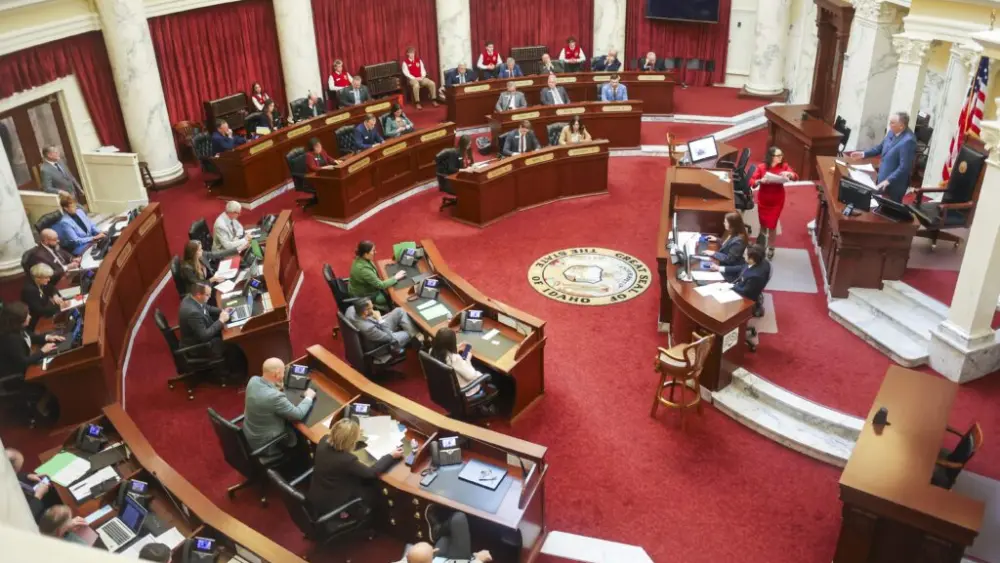BOISE, ID – An Idaho legislative task force is looking to amend Idaho’s child custody laws after months of hearing emotional testimony about high-conflict cases from parents and family members caught in these disputes.
“We knew going into this, this was going to open up a can of worms,” task force co-Chair Rep. Heather Scott, R-Blanchard, said Monday. ”But we had so many compelling stories that were coming forward that, you can’t ignore it, and there does need to be oversight.”
The Child Custody and Domestic Relations Task Force met for what’s likely the second-to-last time on Monday at the Capitol to discuss main takeaways from the five meetings it held across the state starting in July. The task force cannot pass legislation but may provide recommendations to their fellow lawmakers.
The members hope to meet once more to make final recommendations regarding some of the topics, including additional training for those involved in the system, better recognition of patterns of abuse and violence, avoiding lengthy delays in processes that are supposed to be temporary, and more effective use of local law enforcement to uphold court orders.
The document of primary topics was generated using AI from transcripts of the prior meetings, members said Monday.
Additional training on domestic violence and abuse
Legislators discussed adding bans on “coercive control,” which is a pattern of behavior that abusers may use to manipulate or trap their partners, to Idaho’s domestic violence laws.
“I think that would be an easy thing to put in, and I think it would help give some clarification,” task force co-Chair Sen. Tammy Nichols, R-Middleton, said.
She also said she’d like to see more training for judges on manipulation in domestic violence situations.
Task force members also considered ensuring that in-person mediation sessions in custody conflicts aren’t required in cases of documented abuse.
“Maybe we bring in the digital stuff into that, where you don’t have to be in mediation with your abuser if there is documented abuse,” Scott suggested.
Sen. Carl Bjerke, R-Coeur d’Alene, noted that other states have passed legislation modeled after a federal law known as Kayden’s Law, which includes requirements that judges consider child safety in custody decisions and mandates training for judges to better recognize domestic violence.
Legislators in Utah passed a version of the law in 2024, after 16-year Om Gandhi was killed by his father during a court-mandated visit in Salt Lake City amid a contentious custody dispute, Utah News Dispatch reported.
Easing financial imbalances between parents
To address financial imbalances, task force members suggested implementing a process for a parent in a child custody dispute who has far fewer resources to ask the court to require the parent with more money to pay attorney fees for both parties.
Rep. John Gannon, D-Boise, said he’d prepared draft legislation to create the process. Gannon is a civil attorney.
“I think this could help to prevent using the legal system to bully the other, weaker party,” Gannon said. “And I think that there could be some real good results, because the party with resources would have some incentive to maybe minimize the litigation, and both parties would come together and be more likely to resolve the dispute.”
In cases to terminate parental rights of one parent, the state removed the right to public defense in 2025 legislation.
Bjerke described Gannon’s proposal as a “great place to start” to help improve fairness to some of these cases.
“Having the ability to look at exactly what is being expended for each party and trying to make it as equal as possible, it shouldn’t be that one person wins a case because their resources are greater,” Bjerke said.
Time restraints on temporary orders
Legislators spoke at length Monday about how to constrain temporary custody or visitation orders, which are meant to be short-term court directives allowing one parent to assume temporary custody prior to a full custody hearing. The orders are meant to be used in situations of abuse or neglect.
Lawmakers said use of the orders are being drawn out, sometimes for months or years.
“I feel like we have legalized kidnapping,” Rep. Barbara Ehardt, R-Idaho Falls, said. “… One of the most sacred rights, that we don’t give, that a parent has, because that comes from the Lord, is their ability to have and raise their children. And then when we legally take that right away, when there’s nothing criminal that can be pointed to, I believe that is certainly a disservice by the justices, certainly disservice by legislative branch, and I would say the executive branch also. I would hope that this committee will work to remedy this particular part.”
Lawmakers considered implementing a 30-day limit on temporary orders in which there’s no criminal allegations.
Gannon, however, said 30 days seemed too short in some cases.
Bjerke said that the extended time on temporary orders is likely driven by delays and backlogs in the court system.
“If we want to provide something more like a 30-day temporary order, how much more of the system do we create to accomplish that?” Bjerke asked “… None of us want to grow government and to further fund things, but at the same time, we’re not going to be able to take care of this stuff, or a lot of it, without some enhancements made to our current judicial system.”
Better use of law enforcement for custody orders
Some task force members also hope to utilize police more to enforce custody orders. It is a criminal offense to violate a court order regarding custody, such as keeping the child too long, but lawmakers said Monday they are hearing law enforcement officers are hesitant to step into what seems more like a civil matter.
Officers often refer parents back to civil court for enforcement, legislators said.
Scott asked members if the Legislature should clarify that law enforcement has authority to enforce family law.
Bjerke argued that may put officers in the middle of contentious custody disputes.
“We just don’t have the bandwidth in our current law enforcement system to do this,” he said.
Ehardt disagreed, and said that law enforcement handles “domestic problems” daily.
Sen. James Ruchti, D-Pocatello, said that the Legislature may need to implement some type of database so police could access the most up-to-date custody orders if called to enforce a violation.
Task force members have not yet set a meeting date to share proposed legislation.
Members said that, because the area of family law is complicated, often involving emotional or high-conflict cases, there may be a multi-year effort to make changes.
Rep. Marco Erickson, R-Idaho Falls, suggested the group put together an assessment of gaps and a five-year plan.
“There’s still going to be some low-hanging fruit that we could potentially do right away, but this is not a next-session process,” Erickson said. “Obviously, we know this could be up to five years, but if we were to develop something like that, a process in a five year plan, we can start to fill those gaps, put in the pieces of legislation, have the proper conversations with our community partners and the people that would be implementing this on the ground, so that way we’re not causing this massive chaos in the lawyers or in the courts.”
Today’s forecast is brought to you by Idaho Capital Sun.





